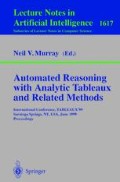Abstract
linTAP is a tableau prover for the multiplicative and exponential fragment \( \mathcal{M}?\mathcal{L}\mathcal{L} \) of Girards linear logic. It proves the validity of a given formula by constructing an analytic tableau and ensures the linear validity using prefix unification. We present the tableau calculus used by linTAP, an algorithm for prefix unification in linear logic, the linTAP implementation, and some experimental results obtained with linTAP.
Access this chapter
Tax calculation will be finalised at checkout
Purchases are for personal use only
Preview
Unable to display preview. Download preview PDF.
References
J.-M. Andreoli. Logic programming with focusing proofs in linear logic. Journal of Logic and Computation, 2(3):297–347, 1992.
B. Beckert, J. Posegga. lean TAP: Lean Tableau-Based Theorem Proving. 12 th Conference on Automated Deduction, LNAI 814, pp. 793–797. Springer, 1994.
B. Beckert, J. Posegga. leanTAP: Lean Tableau-Based Deduction. Journal of Automated Reasoning, 15(3), pp. 339–358, 1995.
B. Beckert, R. Goré. Free Variable Tableaux for Propositional Modal Logics. Proc. 6 th TABLEAUX Conference, LNAI 1227, pp. 91–106, Springer 1997.
W. Bibel. Let’s plan it deductively!. In IJCAI-97, Morgan Kaufmann, 1997.
I. Cervesato, J.S. Hodas, F. Pfenning. Efficient resource management for linear logic proof search. In Extensions of Logic Programming, LNAI 1050, pages 67–81. Springer, 1996.
M. Fitting. First-Order Logic and Automated Theorem Proving. Springer, 1996.
B. Fronhöfer. The action-as-implication paradigm. CS Press, 1996.
D. Galmiche. Connection methods in linear logic fragments and proof nets. Technical report, CADE-13 workshop on proof search in type-theoretic languages, 1996.
D. Galmiche & G. Perrier. On proof normalization in linear logic. TCS, 135:67–110, 1994.
V. Gehlot and C. Gunter. Normal process representatives. Sixth Annual Symposium on Logic in Computer Science, pages 200–207, 1991.
J.-Y. Girard. Linear logic. TCS, 50:1–102, 1987.
J. Harland and D. Pym. Resource-Distribution via Boolean Constraints. 14 th Conference on Automated Deduction, LNCS 1249, pp. 222–236. Springer, 1997.
J.S. Hodas & D. Miller. Logic programming in a fragment of linear logic. Journal of Information and Computation, 110(2):327–365, 1994.
C. Kreitz, H. Mantel, J. Otten, S. Schmitt. Connection-Based Proof Construction in Linear Logic. 14 th Conference on Automated Deduction, LNCS 1249, pp. 207–221. Springer, 1997.
P. Lincoln and T. Winkler. Constant-only multiplicative linear logic is NP-complete. TCS, 135:155–169, 1994.
H. Mantel, C. Kreitz. A Matrix Characterization for MELL. Logics in Artificial Intelligence, JELIA’ 98, LNAI 1489, pp. 169–183, Springer, 1998.
A. Martelli and U. Montanari. An efficient unification algorithm. ACM TOPLAS, 4:258–282, 1982.
M. Masseron, C. Tollu, J. Vauzeilles. Generating plans in linear logic. In Foundations of Software Technology and Theoretical Computer Science, LNCS, Springer, 1991.
D. Miller. FORUM: A Multiple-Conclusion Specification Logic. TCS, 165(1):201–232, 1996.
J. Otten. ileanTAP: An Intuitionistic Theorem Prover. Proc. 6 th TABLEAUX Conference, LNAI 1227, pp. 307–312, Springer 1997.
J. Otten, C. Kreitz. T-String-Unification: Unifying Prefixes in Non-Classical Proof Methods. Proc. 5 th TABLEAUX Workshop, LNAI 1071, pp. 244–260, 1996.
T. Tammet. Proof strategies in linear logic. JAR, 12:273–304, 1994.
N. Tamura. User’s Guide of a Linear Logic Theorem Prover (llprover). Technical report. Faculty of Engineering, Kobe University, Japan, 1995.
L. Wallen. Automated deduction in nonclassical logic. MIT Press, 1990.
Author information
Authors and Affiliations
Editor information
Editors and Affiliations
Rights and permissions
Copyright information
© 1999 Springer-Verlag Berlin Heidelberg
About this paper
Cite this paper
Mantel, H., Otten, J. (1999). linTAP : A Tableau Prover for Linear Logic. In: Murray, N.V. (eds) Automated Reasoning with Analytic Tableaux and Related Methods. TABLEAUX 1999. Lecture Notes in Computer Science(), vol 1617. Springer, Berlin, Heidelberg. https://doi.org/10.1007/3-540-48754-9_20
Download citation
DOI: https://doi.org/10.1007/3-540-48754-9_20
Published:
Publisher Name: Springer, Berlin, Heidelberg
Print ISBN: 978-3-540-66086-6
Online ISBN: 978-3-540-48754-8
eBook Packages: Springer Book Archive

